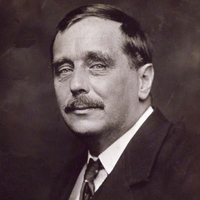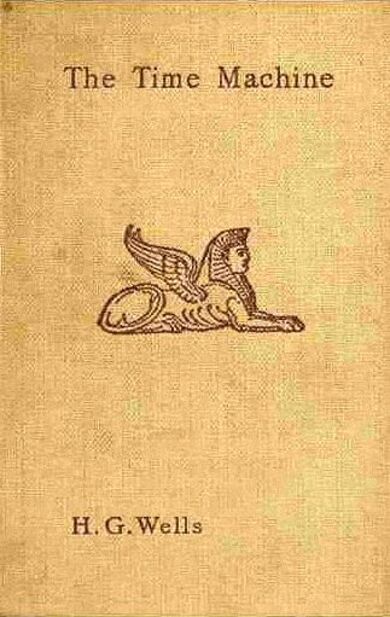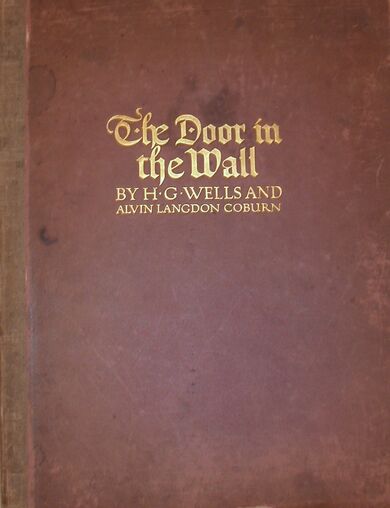‘I TOLD some of you last Thursday of the principles of the Time Machine, and showed you the actual thing itself, incomplete in the workshop. There it is now, a little travel-worn, truly; and one of the ivory bars is cracked, and a brass rail bent; but the rest of it’s sound enough. I expected to finish it on Friday, but on Friday, when the putting together was nearly done, I found that one of the nickel bars was exactly one inch too short, and this I had to get remade; so that the thing was not complete until this morning. It was at ten o’clock to-day that the first of all Time Machines began its career. I gave it a last tap, tried all the screws again, put one more drop of oil on the quartz rod, and sat myself in the saddle. I suppose a suicide who holds a pistol to his skull feels much the same wonder at what will come next as I felt then. I took the starting lever in one hand and the stopping one in the other, pressed the first, and almost immediately the second. I seemed to reel; I felt a nightmare sensation of falling; and, looking round, I saw the laboratory exactly as before. Had anything happened? For a moment I suspected that my intellect had tricked me. Then I noted the clock. A moment before, as it seemed, it had stood at a minute or so past ten; now it was nearly half-past three!
‘I drew a breath, set my teeth, gripped the starting lever with both hands, and went off with a thud. The laboratory got hazy and went dark. Mrs. Watchett came in and walked, apparently without seeing me, towards the garden door. I suppose it took her a minute or so to traverse the place, but to me she seemed to shoot across the room like a rocket. I pressed the lever over to its extreme position. The night came like the turning out of a lamp, and in another moment came to-morrow. The laboratory grew faint and hazy, then fainter and ever fainter. To-morrow night came black, then day again, night again, day again, faster and faster still. An eddying murmur filled my ears, and a strange, dumb confusedness descended on my mind.
‘I am afraid I cannot convey the peculiar sensations of time travelling. They are excessively unpleasant. There is a feeling exactly like that one has upon a switchback—of a helpless headlong motion! I felt the same horrible anticipation, too, of an imminent smash. As I put on pace, night followed day like the flapping of a black wing. The dim suggestion of the laboratory seemed presently to fall away from me, and I saw the sun hopping swiftly across the sky, leaping it every minute, and every minute marking a day. I supposed the laboratory had been destroyed and I had come into the open air. I had a dim impression of scaffolding, but I was already going too fast to be conscious of any moving things. The slowest snail that ever crawled dashed by too fast for me. The twinkling succession of darkness and light was excessively painful to the eye. Then, in the intermittent darknesses, I saw the moon spinning swiftly through her quarters from new to full, and had a faint glimpse of the circling stars. Presently, as I went on, still gaining velocity, the palpitation of night and day merged into one continuous greyness; the sky took on a wonderful deepness of blue, a splendid luminous color like that of early twilight; the jerking sun became a streak of fire, a brilliant arch, in space; the moon a fainter fluctuating band; and I could see nothing of the stars, save now and then a brighter circle flickering in the blue.
‘The landscape was misty and vague. I was still on the hill-side upon which this house now stands, and the shoulder rose above me grey and dim. I saw trees growing and changing like puffs of vapour, now brown, now green; they grew, spread, shivered, and passed away. I saw huge buildings rise up faint and fair, and pass like dreams. The whole surface of the earth seemed changed—melting and flowing under my eyes. The little hands upon the dials that registered my speed raced round faster and faster. Presently I noted that the sun belt swayed up and down, from solstice to solstice, in a minute or less, and that consequently my pace was over a year a minute; and minute by minute the white snow flashed across the world, and vanished, and was followed by the bright, brief green of spring.
‘The unpleasant sensations of the start were less poignant now. They merged at last into a kind of hysterical exhilaration. I remarked indeed a clumsy swaying of the machine, for which I was unable to account. But my mind was too confused to attend to it, so with a kind of madness growing upon me, I flung myself into futurity. At first I scarce thought of stopping, scarce thought of anything but these new sensations. But presently a fresh series of impressions grew up in my mind—a certain curiosity and therewith a certain dread—until at last they took complete possession of me. What strange developments of humanity, what wonderful advances upon our rudimentary civilization, I thought, might not appear when I came to look nearly into the dim elusive world that raced and fluctuated before my eyes! I saw great and splendid architecture rising about me, more massive than any buildings of our own time, and yet, as it seemed, built of glimmer and mist. I saw a richer green flow up the hill-side, and remain there, without any wintry intermission. Even through the veil of my confusion the earth seemed very fair. And so my mind came round to the business of stopping,
‘The peculiar risk lay in the possibility of my finding some substance in the space which I, or the machine, occupied. So long as I travelled at a high velocity through time, this scarcely mattered; I was, so to speak, attenuated—was slipping like a vapour through the interstices of intervening substances! But to come to a stop involved the jamming of myself, molecule by molecule, into whatever lay in my way; meant bringing my atoms into such intimate contact with those of the obstacle that a profound chemical reaction—possibly a far-reaching explosion—would result, and blow myself and my apparatus out of all possible dimensions—into the Unknown. This possibility had occurred to me again and again while I was making the machine; but then I had cheerfully accepted it as an unavoidable risk—one of the risks a man has got to take! Now the risk was inevitable, I no longer saw it in the same cheerful light. The fact is that insensibly, the absolute strangeness of everything, the sickly jarring and swaying of the machine, above all, the feeling of prolonged falling, had absolutely upset my nerve. I told myself that I could never stop, and with a gust of petulance I resolved to stop forthwith. Like an impatient fool, I lugged over the lever, and incontinently the thing went reeling over, and I was flung headlong through the air.
‘There was the sound of a clap of thunder in my ears. I may have been stunned for a moment. A pitiless hail was hissing round me, and I was sitting on soft turf in front of the overset machine. Everything still seemed grey, but presently I remarked that the confusion in my ears was gone. I looked round me. I was on what seemed to be a little lawn in a garden, surrounded by rhododendron bushes, and I noticed that their mauve and purple blossoms were dropping in a shower under the beating of the hail-stones. The rebounding, dancing hail hung in a cloud over the machine, and drove along the ground like smoke. In a moment I was wet to the skin. “Fine hospitality,” said I, “to a man who has travelled innumerable years to see you.”
‘Presently I thought what a fool I was to get wet. I stood up and looked round me. A colossal figure, carved apparently in some white stone, loomed indistinctly beyond the rhododendrons through the hazy downpour. But all else of the world was invisible.
‘My sensations would be hard to describe. As the columns of hail grew thinner, I saw the white figure more distinctly. It was very large, for a silver birch-tree touched its shoulder. It was of white marble, in shape something like a winged sphinx, but the wings, instead of being carried vertically at the sides, were spread so that it seemed to hover. The pedestal, it appeared to me, was of bronze, and was thick with verdigris. It chanced that the face was towards me; the sightless eyes seemed to watch me; there was the faint shadow of a smile on the lips. It was greatly weather-worn, and that imparted an unpleasant suggestion of disease. I stood looking at it for a little space—half a minute, perhaps, or half an hour. It seemed to advance and to recede as the hail drove before it denser or thinner. At last I tore my eyes from it for a moment and saw that the hail curtain had worn threadbare, and that the sky was lightening with the promise of the Sun.
‘I looked up again at the crouching white shape, and the full temerity of my voyage came suddenly upon me. What might appear when that hazy curtain was altogether withdrawn? What might not have happened to men? What if cruelty had grown into a common passion? What if in this interval the race had lost its manliness and had developed into something inhuman, unsympathetic, and overwhelmingly powerful? I might seem some old-world savage animal, only the more dreadful and disgusting for our common likeness—a foul creature to be incontinently slain.
‘Already I saw other vast shapes—huge buildings with intricate parapets and tall columns, with a wooded hill-side dimly creeping in upon me through the lessening storm. I was seized with a panic fear. I turned frantically to the Time Machine, and strove hard to readjust it. As I did so the shafts of the sun smote through the thunderstorm. The grey downpour was swept aside and vanished like the trailing garments of a ghost. Above me, in the intense blue of the summer sky, some faint brown shreds of cloud whirled into nothingness. The great buildings about me stood out clear and distinct, shining with the wet of the thunderstorm, and picked out in white by the unmelted hailstones piled along their courses. I felt naked in a strange world. I felt as perhaps a bird may feel in the clear air, knowing the hawk wings above and will swoop. My fear grew to frenzy. I took a breathing space, set my teeth, and again grappled fiercely, wrist and knee, with the machine. It gave under my desperate onset and turned over. It struck my chin violently. One hand on the saddle, the other on the lever, I stood panting heavily in attitude to mount again.
‘But with this recovery of a prompt retreat my courage recovered. I looked more curiously and less fearfully at this world of the remote future. In a circular opening, high up in the wall of the nearer house, I saw a group of figures clad in rich soft robes. They had seen me, and their faces were directed towards me.
‘Then I heard voices approaching me. Coming through the bushes by the White Sphinx were the heads and shoulders of men running. One of these emerged in a pathway leading straight to the little lawn upon which I stood with my machine. He was a slight creature—perhaps four feet high—clad in a purple tunic, girdled at the waist with a leather belt. Sandals or buskins—I could not clearly distinguish which—were on his feet; his legs were bare to the knees, and his head was bare. Noticing that, I noticed for the first time how warm the air was.
‘He struck me as being a very beautiful and graceful creature, but indescribably frail. His flushed face reminded me of the more beautiful kind of consumptive—that hectic beauty of which we used to hear so much. At the sight of him I suddenly regained confidence. I took my hands from the machine.



